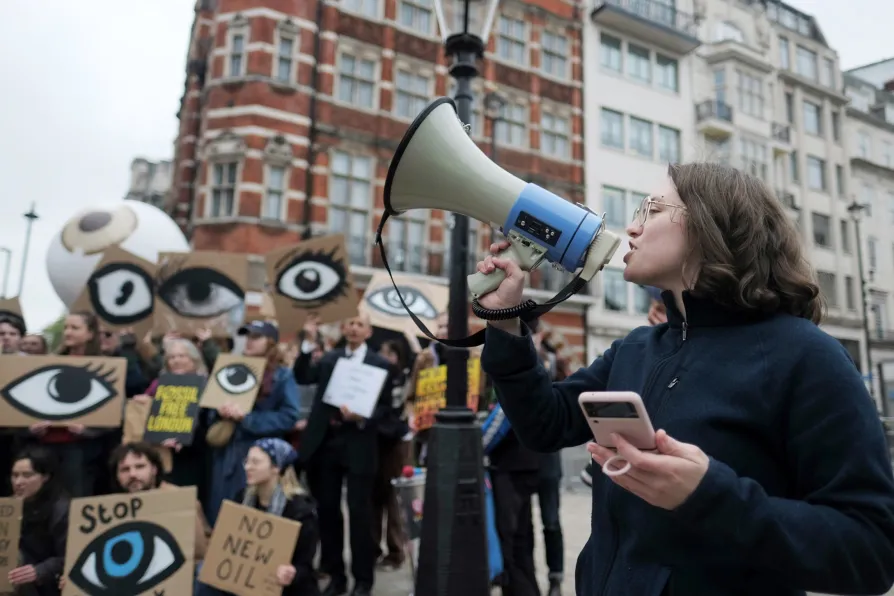Hundreds of protesters rally outside global energy summit in London

 Protesters rally outside the summit. Photo: Angela Christofilou
Protesters rally outside the summit. Photo: Angela Christofilou
HUNDREDS of protesters rallied outside a global energy security summit in London yesterday, urging Prime Minister Sir Keir Starmer “not bow down to the fossil fuel lobby or give in to ridiculous far-right rhetoric.”
Demonstrators demanded that the government deliver a “credible plan” for a just transition for North Sea oil and gas workers as it bans new drilling in British waters.
This includes “grasping the huge opportunity to build out a domestic wind manufacturing sector” alongside investment in ports and setting up a dedicated training fund for offshore oil and gas workers.
Stop Rosebank’s Lauren MacDonald said the demonstration was called to ensure “people’s voices are heard above the noise coming from the oil and gas companies and their cheerleaders in the US government.”
“The public have made their feelings clear with a million people signing a petition to end drilling and we urge the UK government to listen,” she added.
“People want lower bills, a safe climate and to see a proper plan for workers in the oil industry whose bosses are only interested in making as much profit for as long as possible.”
Reform UK leader Nigel Farage has called for Britain to be “self-sufficient in gas” ahead of next week’s local elections.
Greenpeace UK campaigner Lily-Rose Ellis added: “Keir Starmer must not bow down to the fossil fuel lobby, or give in to ridiculous far-right rhetoric and rejections of science.
“Letting them win only serves to make energy bosses even richer, while the rest of us continue to suffer the consequences — high bills, insecurity and the cost-of-living crisis.”
The Prime Minister told the Summit on the Future of Energy Security that clean energy was the way “to take back control of our energy system, ensure energy security, and bring down bills in the long term.”
“The world has changed,” observed Sir Keir as he addressed the first day of the two-day conference, adding that “when it comes to energy we are also paying the price for our exposure over many years to the rollercoaster of international fossil fuel markets.”
He said that energy security comes comes under the government’s national security duties which cannot be delivered “by defending the status quo, nor by trying to turn back the clock.”
Sir Keir announced a deal with energy company Eni which will see the firm awarded around £2 billion in supply chain contracts for its Liverpool Bay carbon capture and storage project, creating 2,000 jobs.
However Downing Street was forced to deny that Britain and US were on “different pages” on green energy after US acting assistant secretary of international affairs Tommy Joyce has told the summit that clean power policies are “harmful and dangerous.”
Energy Secretary Ed Miliband told LBC yesterday that he will not split Britain’s energy market into regions if it raises people’s bills.
He is considering proposals for zonal pricing in the country’s power market which would see different areas of the country pay different rates for their electricity, based on local supply and demand.
The minister rejected as “copper-bottomed nonsense” reports that the move could lead to higher bills in the south-east of England.
End Fuel Poverty Coalition co-ordinator Simon Francis said: “The debate about how to reform electricity markets has been confused by vested interests producing reams of competing analysis to back up their own claims.
“What we need is for the government to set out clearly the pros and cons of the options on the table and make a recommendation on the side of consumers.”
He suggested ending Britain’s “marginal pricing system,” which hooks the cost of electricity to the last and most expensive generator needed to meet demand — nearly always a gas generator.
National Energy Action head of policy and public affairs Matt Copeland added: “While the government accelerates these reforms, deeper and targeted financial support for fuel-poor households will be necessary to ensure that, wherever they live, they can afford enough energy to stay warm at home and keep out of energy debt.”
Energy union GMB’s national officer Charlotte Brumpton-Childs warned that the huge pressure from energy costs on manufacturing could be worsened by zonal pricing.
Uplift deputy director Robert Palmer said: “The key thing driving up UK energy bills is our high dependency on expensive gas, the price over which we have no control.
“The quicker we get off gas by switching to renewables and insulating homes, the quicker our energy bills will fall. Zonal electricity pricing may have a role in bringing down bills.
“An essential step is to ensure that the price of gas doesn’t continue to set the price of electricity, which it currently does most of the time — even though our electricity is increasingly being generated by cheaper homegrown renewable energy.”












